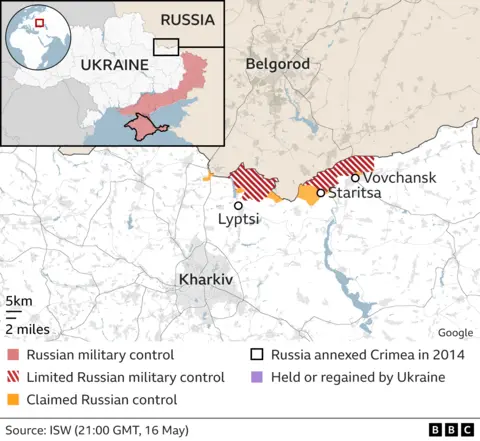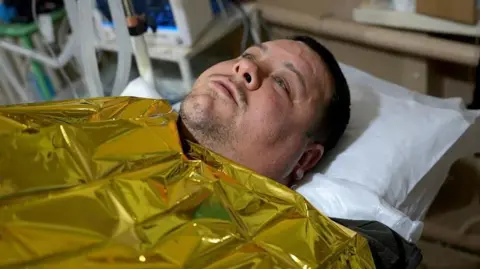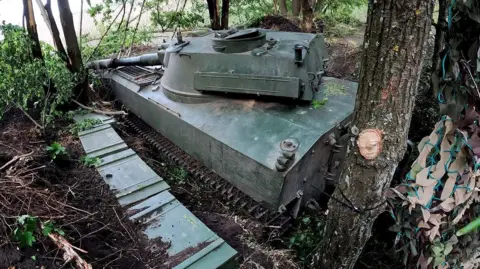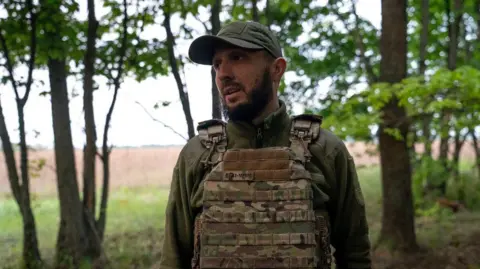
This article is more than
1 year old
The BBC's Jonathan Beale joins Ukrainian forces in Kharkiv as they try to shore up a weakened frontline.
We travel at speed towards the village of Lyptsi – now under siege.
Russian forces have penetrated this border area north of Kharkiv, Ukraine’s second largest city.
We are being escorted by members of Ukraine’s National Guard, among the latest reinforcements to try to halt this most recent Russian advance. They’ve gone from a fierce battle in the east to another further north – without rest.
The heavy thuds of artillery grow louder when we arrive at their position, just a mile from the front line.
We run past a smouldering fire towards a bunker, where we are told to take cover.
In the dank, gloomy basement, a group of soldiers are watching a drone feed. They’re directing Ukrainian artillery fire towards a tree line.
Andrii tells me the situation: “It’s dynamic and tense and hard to predict."
We’ve been told we can’t stay for long. Even underground you can hear the explosions.I ask Andrii whether he and his men’s arrival on this front is making a difference.
“Relatively, but it’s always hard to get involved in someone else’s defence lines because there’s no proper interaction, with other units,” he replies.
But he understands the importance of their task and why the Russians have opened this new front.
“They want to pull our forces from defence lines in Donetsk and Luhansk regions. It was just a question of time. The Russians always use mean tactics," he says.

It’s getting dark outside and they’re now using a thermal image camera on a drone to watch Russian movements. “Our pilot has just found out the movement of the enemy group near to our positions,” Andrii tells me.
We’re told to leave quickly.
At a field hospital well behind the front line, Ukrainian medics are treating yet another casualty.
Viktor has lost some of his fingers in a mortar explosion. He’s lying on a bed, conscious, wrapped in a foil blanket as he receives treatment from a nurse.

But Viktor is more worried about the men he’s left behind. “I can’t live without my guys,” he says, “they’re my friends, my second family." He says he wants to get back to them as soon as he is patched up.
The Russians too have been taking heavy casualties. But there are more of them.
Viktor says they were fighting off wave after wave of attacks. “There are a lot of them,” he says.
Russia’s believed to have massed a force of more than 30,000 just over the border.
Ukraine has not just been outnumbered on this front, it’s also been outgunned.
“The Russians have everything, whatever they want," says Viktor, “and we have nothing to fight with. But we do what we can."
Delays in US military support have made their job more difficult. Ammunition has had to be rationed over the past few months.
On average Russia has been able to fire 10 times as many artillery shells. The hope is the deficit will narrow with the arrival of more US weapons and ammunition.

At an artillery position, hidden in a tree-line outside Vovchansk, men of Ukraine’s 57th Brigade have been firing 50 to 100 rounds a day to defend the town.
When we arrive, they’re waiting for a fresh delivery of ammunition for their Russian-made self-propelled gun. Another 20 rounds are soon delivered by a small van. It’ll keep them going for a few more hours.
This unit too had been fighting further east before the call came to defend Kharkiv.
Ukraine’s defence lines are being stretched and thinned out.
Another brigade nearby has arrived from Robotyne in the south, where Russian forces are also advancing.
The small gains made in Ukraine’s 2023 offensive are slowly but surely disappearing.
This time last year Ukraine was hoping to take back its land. Now it's simply hoping it can hold the line.
Ukrainian reinforcements are making a difference in repelling this latest Russian assault. But at what cost elsewhere on the 800-mile (1,287 km) front?

It’ll be hard to dislodge all the Russian forces who have now gained a significant foothold in the Kharkiv region.
Mykhailo, the Ukrainian artillery commander at the position, tells me: “We are losing Vovchansk and we are also losing the villages around Vovchansk."
And there is a feeling that this could have been avoided if defences had been better prepared.
“We could have used logs and concrete to build defences. Now we’ll [have] to use shells and people to take back this land,” he tells me.